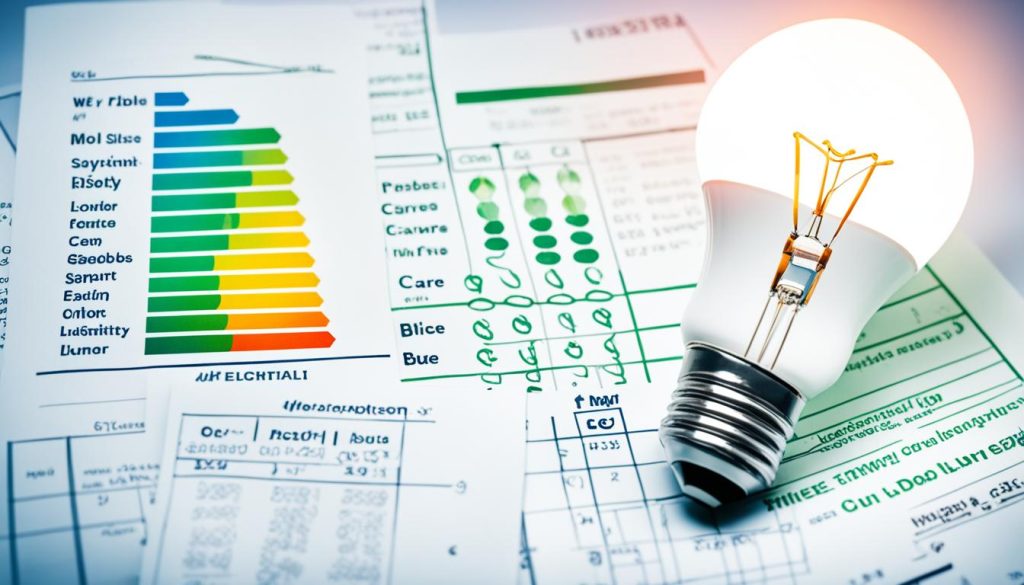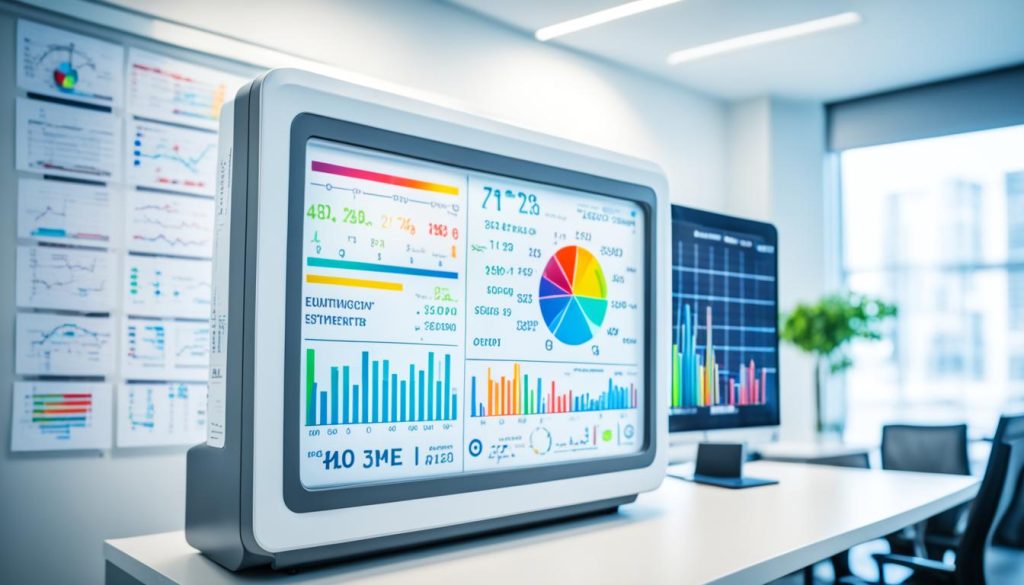Energy bills can be a significant expense for businesses, impacting their bottom line and overall profitability. With the end of government support from the Energy Bills Discount Scheme and Energy Bill Relief Scheme, reducing energy costs has become even more critical for small businesses. The rising costs of energy are a major concern, especially for businesses locked into fixed contracts from 2022.
To combat these challenges, it is essential for businesses to find strategies to reduce their energy bills and save money. By implementing energy efficiency strategies, businesses can minimize their energy consumption, optimize their operations, and contribute to a more sustainable future.
In this article, we will explore practical tips and effective strategies that businesses can employ to lower their energy costs. From conducting an energy audit to implementing energy-saving practices and upgrading to energy-efficient appliances, we will guide you through the steps needed to reduce your business energy bills.
By following these recommendations, businesses can take control of their energy usage and make significant savings. Whether you are a small business owner or a facilities manager, implementing energy-saving measures can benefit your organization’s financial health and environmental impact. Let’s dive into the strategies that will lead to a more energy-efficient and cost-effective future for your business.
How to Reduce Business Energy Bills?
Conduct an Energy Audit to Identify Energy Waste
To identify areas of energy waste and potential savings, it’s recommended to conduct an energy audit. This will help you analyze your energy consumption patterns and identify where you can make changes to reduce energy usage. Look for trends or spikes in energy usage, such as high energy bills overnight when no one is in the office. Government organizations like the Carbon Trust and the Energy Savings Trust offer advice on energy efficiency. Additionally, check if there are any grants or schemes available to help small businesses reduce energy costs.

Conducting an energy audit is a crucial step in understanding and optimizing your business’s energy usage. By assessing your energy consumption patterns, you can identify areas of energy waste and implement strategies to reduce energy costs. This process involves analyzing your energy bills, evaluating energy usage trends, and identifying potential areas for improvement.
During the energy audit, pay close attention to times of high energy usage and potential wastage. For example, if you notice a significant spike in energy consumption during non-operational hours, it may indicate that certain appliances or systems are being left on unnecessarily. By addressing these issues, you can effectively reduce energy waste and lower your business’s energy bills.
To further support your energy-saving efforts, government organizations such as the Carbon Trust and the Energy Savings Trust offer valuable advice and resources on energy efficiency. These organizations provide information on the latest energy-saving technologies, grants, and schemes that can help small businesses reduce their energy costs. Exploring these opportunities can provide you with additional financial support and guidance in implementing energy-saving measures.
By conducting an energy audit and leveraging the advice and support available, you can take proactive steps towards reducing your business’s energy consumption and maximizing cost savings.
Implement Energy-Saving Practices in the Workplace
Implementing energy-saving practices in the workplace is an effective way to reduce energy costs and promote sustainability. By encouraging employees to adopt energy-efficient habits and making simple adjustments to everyday routines, businesses can make a significant impact on their energy bills. Here are some practical energy-saving tips to implement in your workplace:
1. Turn Off Lights and Electrical Appliances
Encourage employees to develop the habit of turning off lights and electrical appliances when not in use. Appliances in standby mode can still consume energy, so remind your staff to switch off computers, printers, and other equipment at the end of the day. Installing motion sensors can also help automatically turn off lights in unoccupied areas, further reducing energy waste.
2. Adjust Heating Settings and Use Programmable Thermostats

Optimize your heating system by adjusting the settings according to business needs. Consider using programmable thermostats to regulate temperature settings and ensure heating is only used when necessary. This helps to avoid unnecessary energy consumption and reduce overall energy costs.
3. Improve Workplace Insulation
Proper insulation is key to preventing heat loss and improving energy efficiency in the workplace. Check for any areas where drafts may be present and seal them off. Insulating windows and doors, as well as utilizing weather stripping, can make a significant difference in reducing heat transfer and lowering energy bills.
4. Consider Energy-Efficient Office Equipment and LED Lighting
Investing in energy-efficient office equipment can lead to long-term savings. Look for appliances with high-energy efficiency ratings and encourage employees to use them. Additionally, replacing traditional incandescent light bulbs with energy-saving LED bulbs can significantly reduce energy consumption while providing the same level of illumination.
5. Engage Employees in Energy-Saving Initiatives
Engaging employees in energy-saving initiatives is crucial for creating a culture of sustainability in the workplace. Encourage them to share their ideas for improving energy efficiency and reward innovative suggestions. By involving your staff, you can foster a sense of ownership and responsibility, ultimately leading to more effective energy-saving practices.
Government Help with Energy Bills for Businesses
It’s worth exploring government schemes and initiatives that provide assistance to businesses looking to reduce their energy bills. The Energy Bills Discount Scheme, for example, offers financial support for eligible businesses, helping them offset the costs of their energy bills. Research available government programs in your area to determine if there are any opportunities for your business to benefit from these initiatives.
Implementing these energy-saving practices can result in significant savings on your business energy bills, while also reducing your carbon footprint. By fostering a culture of sustainability and actively engaging employees in energy-saving efforts, businesses can contribute to a greener future and reap the financial benefits in the process.
Optimize Heating and Cooling Systems
Heating and cooling systems play a crucial role in the energy usage and cost of a business. By optimizing these systems, you can achieve significant energy savings and reduce your overall expenses. Here are some key strategies to consider:
1. Use heating systems selectively
- Avoid unnecessary heating during warm weather to minimize energy consumption.
- Set your thermostats at an appropriate temperature to maintain comfort without excessive energy usage.
2. Prevent simultaneous operation
Make sure that your heating and air conditioning systems are not running simultaneously. This can lead to energy waste and unnecessary expenses. Implement a system to regulate the operation of these systems based on the actual needs of your workplace.
3. Ensure proper insulation
One of the most effective ways to optimize your heating and cooling systems is to ensure that your workplace is appropriately insulated. Insulation helps trap heat during winter and prevents cool air from escaping during summer, reducing the need for excessive heating or cooling. This not only lowers energy bills but also creates a more comfortable working environment for your employees.
4. Regular maintenance
Maintain your heating and cooling systems regularly to ensure optimal performance and efficiency. Schedule professional inspections and cleaning to keep the systems running smoothly and to identify any potential issues that may affect energy consumption.
By incorporating these strategies into your business operations, you can optimize your heating and cooling systems to reduce energy usage and cut down on costs. Not only will this benefit your bottom line, but it will also contribute to a more sustainable and environmentally friendly workplace.

Upgrade to Energy-Efficient Appliances and Lighting
Upgrading to energy-efficient appliances and lighting is a smart move to reduce energy costs and make your business more sustainable. By replacing old and inefficient equipment with energy-efficient models, you can significantly lower your energy consumption and save money in the long run. Regular maintenance and cleaning of your equipment ensure optimal energy performance, maximizing their efficiency. Consider these steps to cut your business energy costs:
- Purchase energy-efficient office equipment: When it’s time to upgrade your office equipment, choose models that have an ENERGY STAR rating. These devices are designed to operate efficiently and consume less energy, resulting in cost savings for your business.
- Replace incandescent lightbulbs with LEDs: Incandescent lightbulbs are notorious for their high energy consumption. Switching to energy-efficient LEDs can significantly reduce your lighting costs. LEDs have a longer lifespan and lower maintenance costs compared to traditional bulbs.
- Install motion sensors: Installing motion sensors in your office spaces can help automatically turn off lights in unoccupied areas. This eliminates energy waste and ensures that lights are only used when needed.
Investing in energy-efficient appliances and lighting not only helps you cut business energy costs but also demonstrates your commitment to sustainability. By using these strategies, your business can contribute to a greener future while enjoying the financial benefits of reduced energy bills.
In addition to upgrading your equipment and lighting, optimizing other aspects of your business can further reduce energy costs. Let’s explore some additional steps you can take in the following sections.
Monitor Energy Usage with Smart Meters
One effective way to manage and reduce your business’s energy consumption is by utilizing smart meters. These devices are not limited to residential use; they can also provide valuable insights for small businesses. By installing a smart meter at your business premises, you gain the ability to accurately track your energy usage and monitor your consumption patterns.
Smart meters offer several advantages when it comes to managing your energy costs. By identifying areas of high energy usage, you can pinpoint opportunities for improvement and implement energy-saving measures. This helps you cut down on unnecessary energy usage and, in turn, reduce your energy bills.
One of the most significant benefits of smart meters is their visual display. These devices provide real-time information about your energy usage, serving as a constant reminder to make conscious energy-saving decisions. With this visual feedback, it becomes easier to stay on top of your energy consumption and make adjustments accordingly.
If you’re interested in getting a smart meter installed for your business, reach out to your energy provider. They can provide you with information on eligibility and the process for acquiring a smart meter that suits your specific needs.
Benefits of Smart Meters for Businesses:
- Accurate tracking of energy usage
- Identification of high energy consumption areas
- Opportunities for energy-saving measures
- Real-time visual feedback on energy usage
By utilizing smart meters, businesses can gain valuable insights into their energy consumption and take proactive steps towards reducing energy costs.

Conclusion
Reducing business energy bills is a crucial aspect of running a sustainable and cost-effective operation. By implementing a combination of short-term and long-term strategies, businesses can significantly cut down on energy costs and contribute to a greener future.
Conducting an energy audit to assess energy waste, implementing energy-saving practices in the workplace, optimizing heating and cooling systems, and upgrading to energy-efficient appliances and lighting are all effective ways to reduce energy consumption. Additionally, monitoring energy usage with smart meters provides valuable insights and helps identify further opportunities for energy savings.
To take energy cost reduction to the next level, businesses can consider investing in energy management software. These solutions provide advanced analytics and reporting capabilities, allowing businesses to track and manage energy usage more efficiently. By leveraging these tools, businesses can optimize their energy consumption, identify areas for improvement, and ultimately reduce their energy bills.
In conclusion, by following this guide to cutting energy costs for businesses, small business owners can take proactive steps towards sustainable energy practices while saving money. By implementing these strategies and considering the potential benefits of energy management software, businesses can achieve significant energy cost reductions and contribute to a more environmentally friendly future.
FAQs
How to reduce energy costs in business?
There are several ways to reduce energy costs in your business:
- Upgrade to energy-efficient appliances and equipment.
- Implement lighting controls, such as timers and motion sensors.
- Improve insulation and seal any drafts in your building.
- Conduct regular maintenance on HVAC systems.
- Encourage employees to be mindful of energy usage.
- Consider renewable energy sources like solar panels.
Do businesses get any help with energy bills?
Yes, there are various programs and initiatives available to help businesses with their energy bills. These can include rebates for energy-efficient upgrades, tax incentives for renewable energy investments, and energy audit programs to identify areas for improvement.
Why is my business electric bill so high?
Several factors can contribute to a high electric bill for your business, including inefficient equipment, poor insulation, excessive energy usage, outdated technology, and fluctuating energy prices.
Will business energy prices go down?
While energy prices can fluctuate based on market conditions, it’s challenging to predict whether business energy prices will go down in the future. Businesses can consider fixing their energy prices to mitigate the risks associated with price fluctuations.
Should I fix my business energy prices until 2024?
Fixing your business energy prices until 2024 can provide stability and predictability in your energy costs, especially if you’re concerned about potential price increases. However, it’s essential to weigh the pros and cons based on your business’s specific needs and the current energy market conditions.
How long should I fix my business energy prices for?
The duration for fixing your business energy prices can vary based on factors like market trends, budget forecasts, and your business’s long-term goals. Some businesses opt for short-term contracts to take advantage of lower prices, while others choose longer-term agreements for price stability over an extended period. Consider consulting with an energy advisor to determine the optimal timeframe for fixing your business energy prices.





